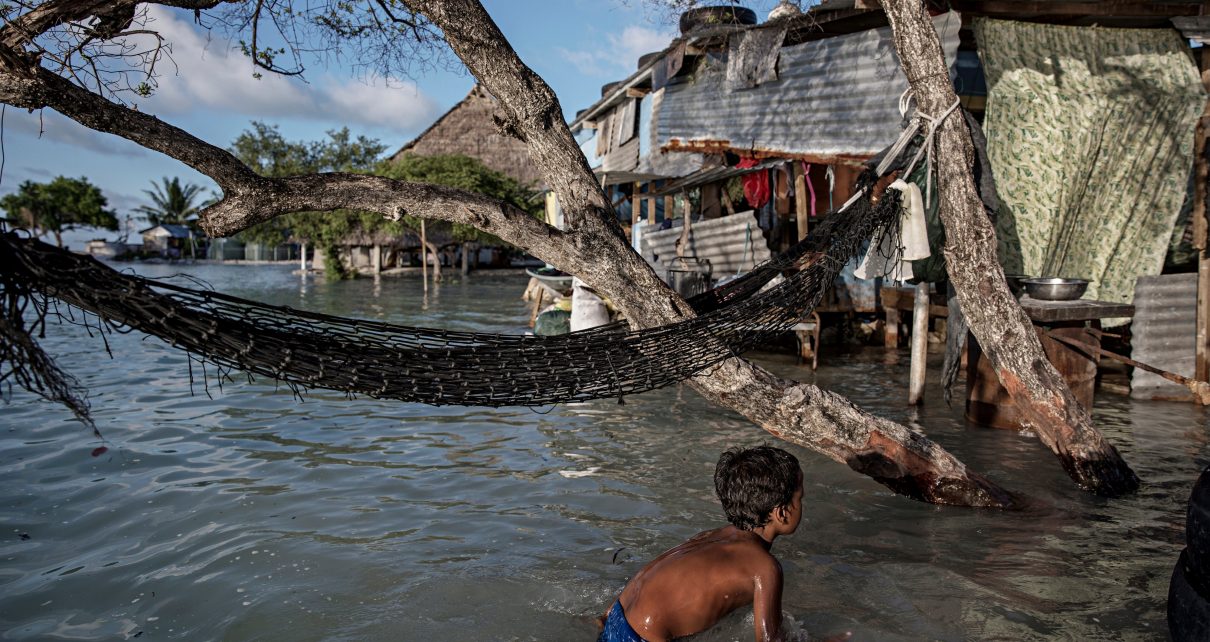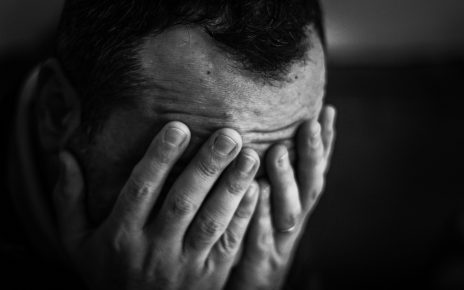When you perform a Google Image search for “victims of climate change,” the faces you see are those of Black and brown people in the tropics. The images depict small reef islands in the Pacific Ocean, arid landscapes in East Africa and flooded villages in South Asia.
At some level, this association seems to make sense: Climate change disproportionately affects indigenous people and people of color, both within North America and around the world. The people and the nations least responsible for the problem are, in many cases, the most threatened.
But the search results also reflect the assumption, common among individuals in the global north—notably Europe and North America—that people in tropical climates are helpless victims who lack the capacity to cope with climate change. Beneath that assumption lies a long, ugly history of climate determinism: the racially motivated notion that the climate influences human intelligence and societal development. In the wake of George Floyd’s death, we need to reckon with systemic racism in all forms. Understanding how climate determinism unfolded historically can reveal the racial biases in present-day conversations about climate change. And it can better prepare us to address the very real inequalities of climate injury and adaptation—which I have seen firsthand while working with colleagues in the Pacific island nation of Kiribati over the past 15 years.
The story starts with the term “climate.” It comes from the ancient Greek word klima, which describes latitude. Greek philosophers deduced that the temperature at a given time of year varies roughly with the klima, because latitude determines how much energy a region receives from the sun. Eratosthenes defined bands of klima, later to be called clim-ata, going from frigid belts in the high latitudes, where there was permanent night in winter, to a hot band near the equator.
That is the sanitized origin story in most old textbooks. Here’s the part you’re not told: Using the concept of the “golden mean,” the ideal balance between two extremes, Greek philosophers argued that civilization thrived the most in climates that were neither too hot nor too cold. Greece, not so coincidentally, happened to be in the middle climate. The Greek people used climate to argue that they were healthier and more advanced than their neighbors to the north and south.
Scan the ancient Greek and Roman texts taught in philosophy classes—from Aristotle, Herodotus, Hippocrates, Plato, Cicero, Ptolemy, Pliny the Elder—and you will find passages that use climate differences to make harsh claims about other races. Hippocrates, often called the father of modern medicine, argued that more equatorial civilizations to the south were inferior because the climate was too hot for creativity. In Politics, Aristotle argued that people in cold climates were “full of spirit, but wanting in intelligence and skill,” whereas those in warm climates were “wanting in spirit, and therefore they are always in a state of subjection and slavery.” These ideas were parroted by scholars across Europe and the Islamic world throughout the Middle Ages. Ibn al-Faqlh, a Persian geographer in the 10th century, asserted people in equatorial climates were born “either like uncooked pastry or like things so thoroughly cooked as to be burnt.” Another suggested northerners tended toward albinism.
During the Enlightenment scientists used stories of heat and disease from tropical expeditions to build faux empirical evidence for racially loaded climate determinism. Scholars, as well as national leaders, advanced the European colonial view of tropical people and society as a lesser other, a practice referred to today as “tropicality.” Immanuel Kant argued in the late 1700s that a mix of warm and cold weather made Europeans smarter, harder-working, prettier, more civilized and wittier than the “exceptionally lethargic” people in the tropics. David Hume claimed that southern people were more sexual because their blood was heated. These arguments were also adapted to claim superiority over indigenous people of North America: writers such as Montesquieu claimed that the more extreme weather of the American colonies created degeneracy.
Blatant climate determinism persisted in the academic literature well into the last century. Geographer Ellsworth Huntington’s 1915 book Civilization and Climate featured tropicality-infused maps of “climatic energy” and “level of civilization”—which the journal Nature highlighted as showing “remarkably close agreement” when it published his 1947 obituary.
Although such claims no longer appear in textbooks, tropicality lives on in Western popular culture and everyday discourse. Think of how movies, books and vacation ads depict tropical islands as unsophisticated places where you can get your mind off the busy tasking of advanced society. The subtext: it is hot here, so no one works hard. Movies and TV programs also present certain tropical locations as dangerous, dirty and disease-ridden because of the climate. The 2020 Netflix film Extraction literally imposes a yellow filter on images of Bangladesh to disguise the blue skies.
Research and media coverage of climate are not immune from this cultural history. Well-intentioned efforts to document and spread stories about the inequalities of climate change inadvertently call up implicit climatic biases. For example, story after story presents the people of low-lying Pacific island nations such as Kiribati and Tuvalu as potential climate “refugees”—victims in need of hand-holding rather than resilient individuals able to make conscious and informed decisions about their future. Warnings that climate change could help trigger mass migration, violence and political instability focus almost exclusively on the global south—Latin American, Africa, and South and Southeast Asia—and ignore the likelihood of similar unrest in Europe and North America, despite current events. This implicit bias rears its head in coverage of climate change in the U.S. Deep South, too: Why were Black Americans who were moving to Houston after Hurricane Katrina called “refugees,” a word applied to international migrants, when they had not left the country?
The problem persists, in part, because predicting the impacts of climate change inevitably requires assumptions about people and society. Science can project future climate conditions and those conditions’ impacts on the environment at any latitude. But there is no formula for calculating how individuals, communities or society at large will respond. This inexactness opens the door for implicit biases, developed over hundreds of years of deterministic thinking, to influence conclusions about who is, and who is not, capable of adapting to climate change. For example, a 2018 study in Nature Climate Change found that research on climate and conflict suffers from a “streetlight” effect; researchers tend to conclude that climate change will cause violence in Africa and the Middle East because that is where they choose to look.
This legacy of deterministic thinking matters because it can do real-world damage. Rhetoric about climate refugees robs people of agency in their own future. Adaptation is possible, even in low-lying atoll nations. But good luck to them in securing international investment, loans or assistance for adaptation when every story says their community is doomed. People across the tropics have been pushing back. The slogan of the Pacific islands’ youth group the Pacific Climate Warriors—“We are not drowning. We are fighting.”—is an explicit rebuke to reflexive, racially loaded assumptions that the people of the Pacific are not up to the challenge.
Climate change is about legacy. We are seeing the legacy of past greenhouse gas emissions in today’s warming climate. And we are seeing the legacy of systemic racism and inequality in the impacts of that warming: indigenous peoples in the Arctic losing a way of life; people of color in the U.S. being disproportionately affected by extreme heat; slum dwellers in Chennai, India, suffering from floods. We need to spread the word about the inequalities of climate change. To do so responsibly, we must be willing to check our implicit biases before drawing conclusions about people living in different places.


